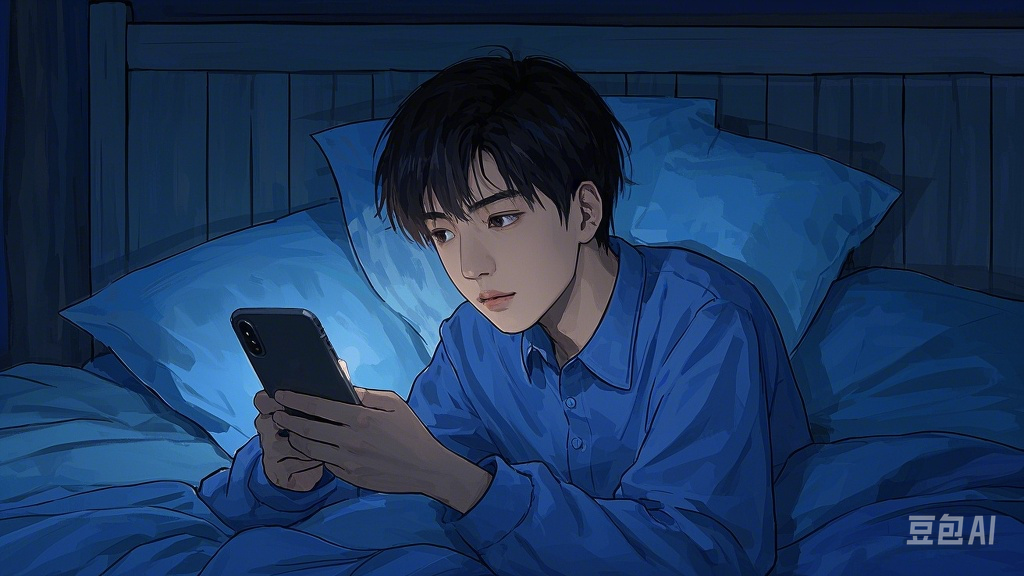
Chinese young adults are staying up later than ever. A recent survey by the Chinese Sleep Research Society found that the average bedtime in China is now 00:18, 17 minutes later than last year.
Late Nights and Mobile Phones
About 80% of college students stay awake past midnight, with 25% falling asleep after 2 am. Smartphones are a major cause of this trend. Data from 150,000 wearable devices shows that longer phone use leads to later bedtimes. Phones distract young people from sleep. They scroll through videos or read novels even when exhausted. A Zhejiang Xiaohongshu user shared, “I watch short videos or read easy novels in bed — it’s mindless fun after a busy day.”
Revenge Bedtime Procrastination (拖延)
On social media, young people describe sacrificing sleep to regain control of their time. A netizen from Zhejiang province posted, “After work, I lie in bed watching short videos or reading novels. It’s mindless but relaxing.” Similarly, a Guangxi worker commented, “I play on my phone until midnight, even though I must wake up at 7 am. I just don’t want the day to end. Work feels suffocating (束缚性的), so nighttime is my escape.”
Health Risks and Solutions
Sleep problems are rising nationwide. About 65% of survey participants reported weekly issues like insomnia (失眠), waking up too early, or snoring. Dr. Wang Zan, a neurology expert, stressed that healthy sleep requires more than just hours: “Quality matters — efficiency, timing, regularity and satisfaction are key.”
To improve sleep, experts recommend: Keeping bedrooms cool and dark; Avoiding screens before bed; Listening to some white noise; Sticking to regular sleep schedules; Moderate (适度的) exercise.
While late-night freedom feels rewarding, balancing rest and routines remains vital for long-term health. Sleep is the foundation of wellness — ignoring it risks both body and mind.
原创编写 版权所有 侵权必究! 每日更新 个性化阅读 英语飙升!
1.1. From the survey, we can know ________.
A the differences of sleep habits between students and workers
B the health risks of too much smartphone use
C the increasing trend of nighttime activity among young adults
D the importance of the revenge bedtime procrastination
解析:选C。细节理解题。根据第一段的“Chinese young adults are staying up later than ever.”可知,该研究强调了年轻人夜间活动的增长趋势。故选C。
2.2. What does the underlined word “exhausted” mean?
A Quite excited.
B Very annoyed.
C Slightly bored.
D Extremely tired.
解析:选D。词义猜测题。结合后文一位网友所说的“I watch short videos or read easy novels in bed — it’s mindless fun after a busy day.”忙碌了一天之后熬夜在床上看短视频或阅读简单的小说,可推测此处表达的是年轻人即便忙碌了一天很累了还是会继续玩手机。故选D。
3.3. Why do young people engage in “revenge bedtime procrastination”?
A To finish urgent work tasks.
B To regain control over their time.
C To communicate with friends online.
D To avoid using smartphones.
解析:选B。细节理解题。根据第三段的“On social media, young people describe sacrificing sleep to regain control of their time.”以及“Work feels suffocating, so nighttime is my escape”可知,一些年轻人熬夜是为了重新获得对时间的控制感。故选B。
4.4. Which of the following is NOT suggested by experts to improve sleep?
A Making sleep environment ideal.
B Turning off phones before sleeping.
C Eating snacks that aid sleep.
D Following a fixed bedtime routine.
解析:选C。细节理解题。根据文章最后一部分的内容可知,专家提到了确保房间凉爽黑暗(良好的睡眠环境)、听一些白噪音、避免睡前屏幕使用(睡前关掉手机)、规律作息(有固定的就寝时间)、适度运动,未提到睡前吃助眠食物。故选C。